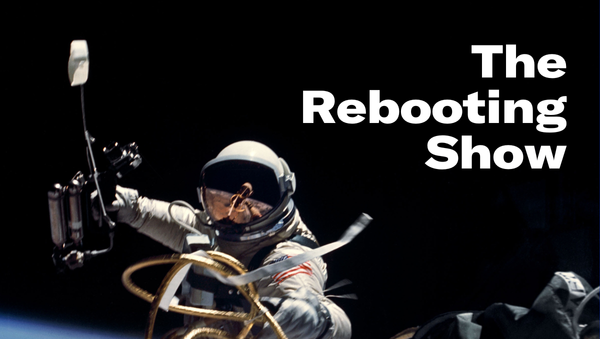Message received
Elon Musk is done with advertising

The good news is if you end up on stage telling your customers to “go fuck yourself,” you can always chalk it up to simply being an “explicit point of view.” Elon Musk is clearly not running an Applebee’s, where the customer is always right. I have some thoughts.
First, a reminder to check out research The Rebooting did in collaboration with BlueConic into the state of the subscriptions business at publishers. We surveyed over 200 publishers, and found a shift in the strategic priority of subscriptions business lines to become more integrated within the overall business. Filling the top of the funnel with more subscribers is still a top priority, but increasingly publishers are focused on wringing more revenue per subscriber and making sure their different business lines work together seamlessly rather than be viewed as almost contradictory objectives.
Get the full report here, and listen to my podcast discussion of it and the state of publisher subscriptions overall with BlueConic director of sales Patrick Crane. Thanks to BlueConic for supporting this research.
Message received

Not to be all Ben Thompson, but yesterday’s GFY heard around the world from Elon Musk didn’t surprise me. On Tuesday, I wrote this:
“Musk is throwing in the towel on ads. I don’t like to play psychotherapist to billionaires. I also do not think Elon Musk is “crazy.” Whether he’s wrong is an open question. But it’s clear he’s tanking X’s ad business because he believes it does not align with what he sees as the mission for the company. That leaves the question of why he brought in Linda Yaccarino as a CEO an executive who is known for her ad sales prowess. Never a great sign when the people you’re trying to sell to are urging you to quit. Expecting Musk to not say something outrageous that aggravates ad buyers is the definition of insanity.”
This has been a clear direction almost from the start of Musk’s Twitter takeover. The way he sees the world, and crucially what’s made him remarkably successful, runs completely counter to being in the ad business. The idea of the world’s richest and possibly most powerful person kowtowing to The Brands was always ludicrous. He showed up at Possible last spring and likely decided this is not a great use of his time. Was he going to head off to Cannes to do a “fireside chat” with Martin Sorrell and host cocktails at Eden Roc? I don’t think so.
Instead, he chose violence, using the DealBook conference to call advertisers leaving X blackmailers and telling them to “go fuck yourself” rather than do a faint-hearted “listening tour,” or apologizing if he offended anyone. It was a billionaire’s version of Michael Douglass in “Falling Down.”
Everything I’ve read about Musk and the hours of interviews with him indicates he’s got a singularly engineering mind. I’ve seen throughout my career the divide between those with engineering minds and the bizarre world of traditional advertising, replete with smoke and mirrors, fake air kisses and squishy talk of purpose and “lovemarks.” This isn’t Mars and Venus. This divide is galaxies away.
Silicon Valley has eaten the advertising business by bending it to its will. For the most part, it has skipped the high-touch portion of the business for the rough-and-tumble of direct marketing, now reimagined as “performance marketing.” Sure, Google, Meta and Amazon play along with the brands, but they’re impervious to advertiser boycotts because big brands are a small portion of their overall customer base of millions. And their dominance in their sectors makes them unavoidable. The type of advertising Amazon does with its search listings business is nowhere near the type of demand generation pizazz Linda Yaccarino was selling at NBCU. This is more like the Yellow Pages than the Super Bowl.
Silicon Valley is insular like any community. And that means trends come and go. In Web 2.0, the trend was advertising models for free software. Startups would talk about amassing scale and then “turning on the revenue spigot” with ads. Those days are mostly over. Subscriptions have proven a better model for software.
The clip of Musk’s profane response to advertisers who are pulling out of Twitter is jarring. There’s an uncomfortable silence you tend to get when someone utters the outrageous and uncomfortable. The entire interview is worth listening to. And it was an interview. Andrew Ross Sorkin came prepared, and he stayed on point when Musk tried to go off on tangents. It stood in contrast to a congenial conversation with someone like Joe Rogan. There’s room for both, but the upside of a newsmaking interview by a professional like Sorkin is moments like that.
An obvious conclusion from the interview is that, with his hand-picked figurehead CEO in the front row, Musk was not just tanking X’s ad business but the entire company. He’s set up the narrative for his failure as being not he who killed Twitter but the faceless brands. Musk has clearly learned plenty from Trump. Blaming faceless marketing people is not all that different from blaming the Deep State.
Never mind the truth, we all have our own versions of it. The narrative is more important. One of the more interesting pars of the interview is when Sorkin gets Musk to talk about his turbulent mind and the chaotic downsides of it. There’s naturally talk of failure – you don’t invent reusable rockets without seeing failure as literally an important part of the process – and he notes that on balance, more good than bad comes from the chaos he creates. Twitter might die, sure, but in the grand scheme of things, it will be a footnote in Musk’s story.
And, to be fair, there is a kernel of truth in the substance of what Musk said. Advertisers do grandstand and seemingly spend a lot of time swanning about the conference circuit built to cater to them. Brands have their halls of fame and constant honors for bravery, all on account of controlling ad spending. Most of the problems of the media ecosystem can be laid at the feet of those who control the budgets. One longtime digital media exec texted me after GFY: “When he said it, he won me for life. I am getting a Cyber Truck.”
Of course, publishers like to point fingers at outside forces for the pitfalls of their businesses. On the latest episode of People vs Algorithms, Troy Young gives a spirited, Captain Capitalism defense of Arena Group’s use of AI-generated SEO commerce gunk. In essence, Troy’s defense comes down to: Do you know how hard it is to make money as a publisher right now? Grow up, this is just part of the process of finding a path to sustainability. Nobody said it would pretty or charming.
That’s because, as publishers know well, the ad business is often illogical and possibly more mercurial than Musk. It can gyrate wildly. And publishers have little control of their distribution, putting themselves in a double bind. I don’t think it took very long for Musk to figure this out. The parts of the ad business that the engineering mind like are in the direct marketing part that’s driving by math and quantifiable results. Ironically he bought the one scaled tech platform that is more reliant on the other part of advertising, the part that’s more about branding, since Twitter doesn’t have the kind of intent signals other platforms have.
Big brands care about flaccid concepts like brand safety and alignment. And sure, they’re hypocrites – aren’t we all? – but you only get a pass if you perform. Twitter has never been a must-buy on the basis of performance. Musk made sure to specifically call out Bob Iger in the audience during his GFY, since Disney is among the advertisers who have paused spending due to Musk’s latest controversial post that strayed into the territory of Protocols of the Elders of Zion. The truth is Disney’s business is not going to be hurt by not advertising on X.
I believe he knows this. The subscription model is the only path for X, at least as teh core of its business if it is truly going to maximize free speech. I believe that’s why he shrunk the size of the organization. The ad business will be niche, more digital SkyMall than vying for the TV ad budgets Linda Yaccarino has been adept at grabbing. I’m unclear the point of her role at the company with that focus.
Musk’s bet seems to be that his millions of acolytes will turn around and boycott The Brands out of pique for “killing Twitter.” Never say never, but that’s a hard narrative to spin, even for Rocket Man..
Send me your feedback by hitting reply.
For sponsorship information, check out The Rebooting’s 2024 packages and get in touch.




